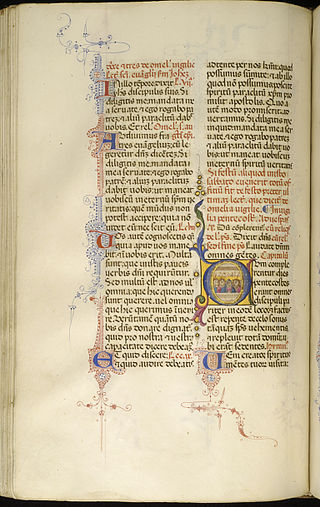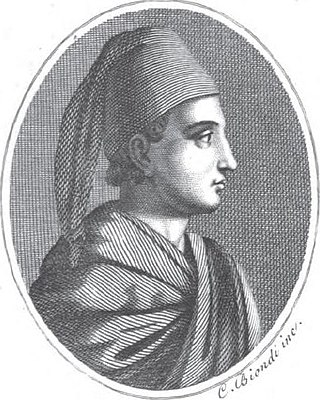
The Roman Breviary is a breviary of the Roman Rite in the Catholic Church. A liturgical book, it contains public or canonical prayers, hymns, the Psalms, readings, and notations for everyday use, especially by bishops, priests, and deacons in the Divine Office.

Vespers is a liturgy of evening prayer, one of the canonical hours in Catholic, Eastern Orthodox, Oriental Orthodox, and Lutheran liturgies. The word for this prayer time comes from the Latin vesper, meaning "evening".
Matins is a canonical hour in Christian liturgy, originally sung during the darkness of early morning.

Lauds is a canonical hour of the Divine office. In the Roman Rite Liturgy of the Hours it is one of the major hours, usually held after Matins, in the early morning hours.
Vexilla regis prodeunt is a Latin hymn in long metre by the Christian poet and saint Venantius Fortunatus, Bishop of Poitiers. It takes its title from its incipit.

Psalm 119 is the 119th psalm of the Book of Psalms, beginning in the English of the King James Version: "Blessed are the undefiled in the way, who walk in the law of the Lord". The Book of Psalms is in the third section of the Hebrew Bible, the Khetuvim, and a book of the Christian Old Testament. The psalm, which is anonymous, is referred to in Hebrew by its opening words, "Ashrei temimei derech". In Latin, it is known as "Beati inmaculati in via qui ambulant in lege Domini".

The Liturgy of the Hours, Divine Office, or Opus Dei are a set of Catholic prayers comprising the canonical hours, often also referred to as the breviary, of the Latin Church. The Liturgy of the Hours forms the official set of prayers "marking the hours of each day and sanctifying the day with prayer." The term "Liturgy of the Hours" has been retroactively applied to the practices of saying the canonical hours in both the Christian East and West–particularly within the Latin liturgical rites–prior to the Second Vatican Council, and is the official term for the canonical hours promulgated for usage by the Latin Church in 1971. Before 1971, the official form for the Latin Church was the Breviarium Romanum, first published in 1568 with major editions through 1962.

The Office of the Dead or Office for the Dead is a prayer cycle of the Canonical Hours in the Catholic Church, Anglican Church and Lutheran Church, said for the repose of the soul of a decedent. It is the proper reading on All Souls' Day for all departed souls (Purgatory), and can be a votive office on other days when said for a particular decedent. The work is composed of different psalms, scripture, prayers and other parts, divided into The Office of Readings, Lauds, Daytime Prayer, Vespers and Compline.
Marcin Mielczewski was, together with his tutor Franciszek Lilius and Bartłomiej Pękiel, among the most notable Polish composers in the 17th century.

An antiphonary or antiphonal is one of the liturgical books intended for use in choro, and originally characterized, as its name implies, by the assignment to it principally of the antiphons used in various parts of the Latin liturgical rites.
The Benedictine Rite is the particular form of Mass and Liturgy celebrated by the Benedictine Order, as based on the writings of St. Benedict on the topic.
The Ambrosian hymns are a collection of early hymns of the Latin liturgical rites, whose core of four hymns were by Ambrose of Milan in the 4th century.

Te lucis ante terminum is an old Latin hymn in long metre. It is the hymn at Compline in the Roman Breviary.

A liturgical book, or service book, is a book published by the authority of a church body that contains the text and directions for the liturgy of its official religious services.
Long metre or long measure, abbreviated as L.M. or LM, is a poetic metre consisting of four line stanzas, or quatrains, in iambic tetrameter with alternate rhyme pattern ABAB. The term is also used in the closely related area of hymn metres. When the poem is used as a sung hymn, the metre of the text is denoted by the syllable count of each line; for long metre, the count is denoted by 8.8.8.8, 88.88, or 88 88, depending on style.

A breviary is a liturgical book used in Christianity for praying the canonical hours, usually recited at seven fixed prayer times.

Conditor alme siderum is a seventh-century Latin hymn used during the Christian liturgical season of Advent. It is also known in English as Creator of the Stars of Night, from a translation by J.M. Neale.
The Cistercian Hymnal is a compilation of the ancient texts and melodies sung by Cistercian monks and nuns during the Liturgy of the Hours. This collection of hymns influenced the Cistercian Order's identity, since early abbots emphasized the compositions' musical quality. The hymnal developed in the course of the centuries.

Elpis, also known as Elphe or Elpide, was a Latin poet and hymnographer, and the first wife of Severinus Boethius. Two hymns of praise to the apostles Peter and Paul are traditionally attributed to her.











